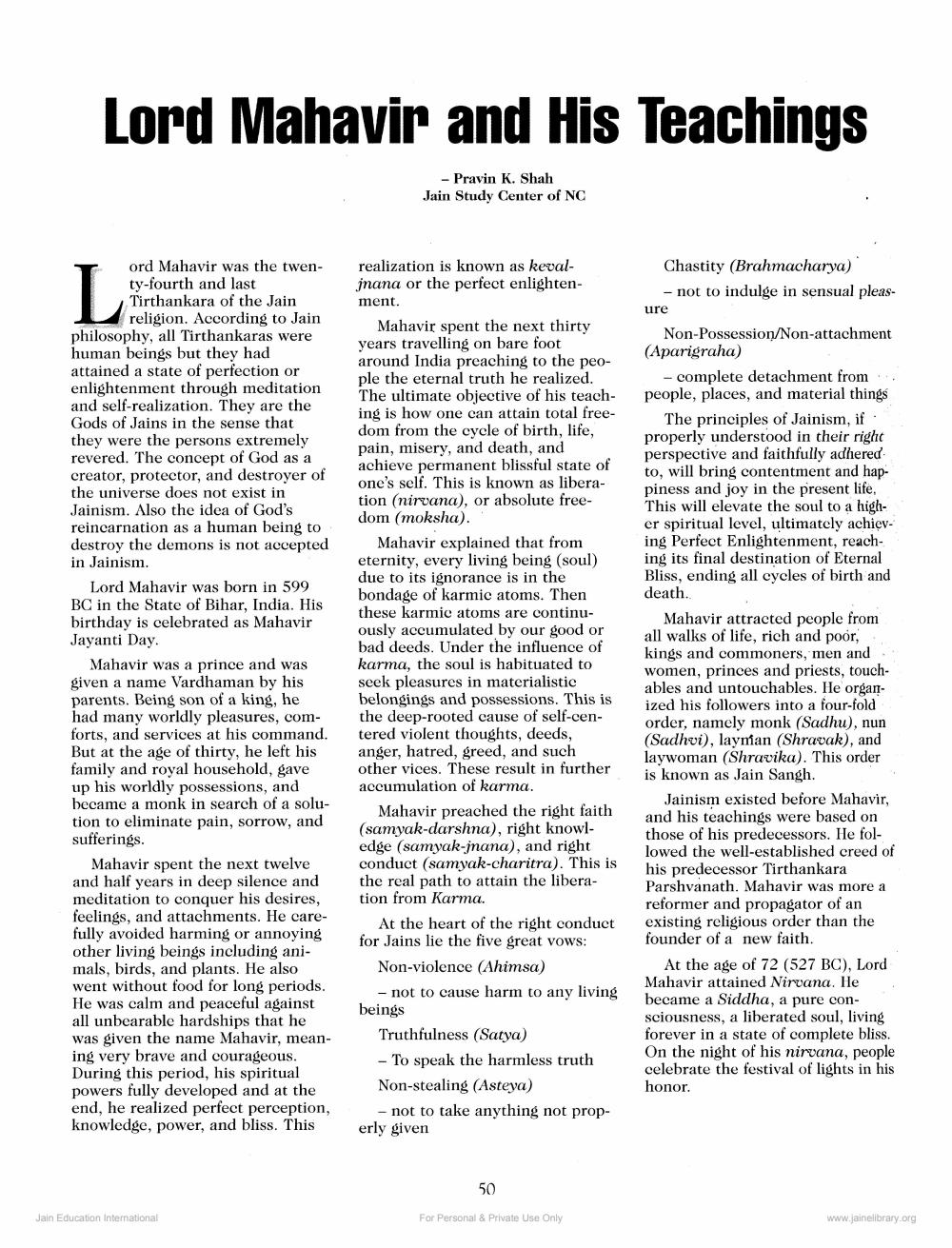________________
Lord Mahavir and His Teachings
- Pravin K. Shah Jain Study Center of NC
ord Mahavir was the twenty-fourth and last Tirthankara of the Jain
religion. According to Jain philosophy, all Tirthankaras were human beings but they had attained a state of perfection or enlightenment through meditation and self-realization. They are the Gods of Jains in the sense that they were the persons extremely revered. The concept of God as a creator, protector, and destroyer of the universe does not exist in Jainism. Also the idea of God's reincarnation as a human being to destroy the demons is not accepted in Jainism.
Lord Mahavir was born in 599 BC in the State of Bihar, India. His birthday is celebrated as Mahavir Jayanti Day.
Mahavir was a prince and was given a name Vardhaman by his parents. Being son of a king, he had many worldly pleasures, comforts, and services at his command. But at the age of thirty, he left his family and royal household, gave up his worldly possessions, and became a monk in search of a solution to eliminate pain, sorrow, and sufferings.
Mahavir spent the next twelve and half years in deep silence and meditation to conquer his desires, feelings, and attachments. He carefully avoided harming or annoying other living beings including animals, birds, and plants. He also went without food for long periods. He was calm and peaceful against all unbearable hardships that he was given the name Mahavir, meaning very brave and courageous. During this period, his spiritual powers fully developed and at the end, he realized perfect perception, knowledge, power, and bliss. This
realization is known as kevaljnana or the perfect enlightenment.
Mahavir spent the next thirty years travelling on bare foot around India preaching to the people the eternal truth he realized. The ultimate objective of his teach- ing is how one can attain total freedom from the cycle of birth, life, pain, misery, and death, and achieve permanent blissful state of one's self. This is known as liberation (nirvana), or absolute freedom (moksha).
Mahavir explained that from eternity, every living being (soul) due to its ignorance is in the bondage of karmic atoms. Then these karmic atoms are continuously accumulated by our good or bad deeds. Under the influence of karma, the soul is habituated to seek pleasures in materialistic belongings and possessions. This is the deep-rooted cause of self-centered violent thoughts, deeds, anger, hatred, greed, and such other vices. These result in further accumulation of karma.
Mahavir preached the right faith (samyak-darshna), right knowledge (samyak-jnana), and right conduct (samyak-charitra). This is the real path to attain the liberation from Karma.
At the heart of the right conduct for Jains lie the five great vows:
Non-violence (Ahimsa)
- not to cause harm to any living beings
Truthfulness (Satya) - To speak the harmless truth Non-stealing (Asteya)
- not to take anything not properly given
Chastity (Brahmacharya)
- not to indulge in sensual pleasure
Non-Possession/Non-attachment (Aparigraha)
- complete detachment from . people, places, and material things
The principles of Jainism, if properly understood in their right perspective and faithfully adhered to, will bring contentment and happiness and joy in the present life. This will elevate the soul to a higher spiritual level, ultimately achieving Perfect Enlightenment, reaching its final destination of Eternal Bliss, ending all cycles of birth and death.
Mahavir attracted people from all walks of life, rich and poor, kings and commoners, men and women, princes and priests, touchables and untouchables. He organized his followers into a four-fold order, namely monk (Sadhu), nun (Sadhvi), layman (Shravak), and laywoman (Shravika). This order is known as Jain Sangh.
Jainism existed before Mahavir, and his teachings were based on those of his predecessors. He followed the well-established creed of his predecessor Tirthankara Parshvanath. Mahavir was more a reformer and propagator of an existing religious order than the founder of a new faith.
At the age of 72 (527 BC), Lord Mahavir attained Nirvana. He became a Siddha, a pure consciousness, a liberated soul, living forever in a state of complete bliss. On the night of his nirvana, people celebrate the festival of lights in his honor.
50
Jain Education International
For Personal & Private Use Only
www.jainelibrary.org




